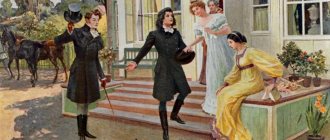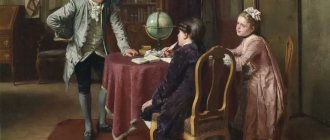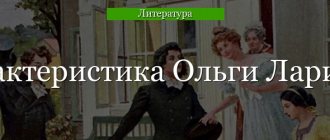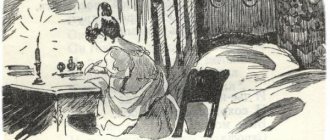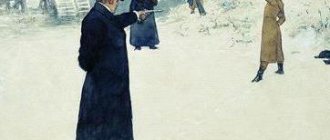Views of Pushkin and Onegin: comparison
In the poetic novel “Eugene Onegin” by Alexander Sergeevich Pushkin, the main character, whose name is in the title of the work, appears to the reader as a living, really existing person, a close friend of the author.
They are similar in many ways, which is why they are friends, but some of the views of these two extraordinary personalities do not coincide. Which ones?
Let's start with the fact that Onegin is a pragmatist, an economist, “a learned fellow, but a pedant,” as the world spoke of him. He “could not distinguish an iambic from a trochee,” scolded the great ancient poets Homer and Theocritus, but he read Adam Smith, the famous Scottish economist.
Onegin was sharp-tongued, quite straightforward in his judgments, caustic in his statements - and therefore had no friends, being, in fact, lonely and incomprehensible.
Of course, in many ways the hero of the novel was strikingly different from his creator - a creative, passionate, passionate, inspired personality, surrounded by numerous friends.
Onegin's views on life, society, and relationships were formed under the influence of character traits, like those of any other person. He is much more cold-blooded and calm than Pushkin.
Due to these differences, the hero is not the same as his creator, but this does not prevent them from being friends. Apparently, it was precisely the dissimilarity of characters and views that attracted Pushkin to the character created by his imagination.
Nature is alien to Onegin, he is a city dweller, a dandy, pedantic in his clothes:
You can be a practical person And think about the beauty of your nails: Why fruitlessly argue with the century? The custom is despot between people. The second Chadayev, my Evgeniy, Fearing jealous condemnations, Was a pedant in his clothes And what we called a dandy.
And although this man was so careful about his appearance, in life he was deeply disappointed and sincerely not interested in anything. He was tired and bored with everything: creativity did not attract Onegin, nature did not please him, romance did not evoke any emotional response.
In this his views were strikingly different from Pushkin’s. The great poet loved nature, subtly felt its condition, and was ready and able to love.
However, in many ways they are like twin brothers, two peas in a pod. For example, both are disappointed in people and cannot help but despise them:
He who lived and thought cannot help but despise people in his soul; Those who have felt are disturbed by the Phantom of irrevocable days: There are no charms for that one, The serpent of memories gnaws at that one, Repentance gnaws at that one. All this often adds great charm to the conversation. At first Onegin's language confused me; but I’m used to his caustic argument, And to the joke, with bile in half, And the anger of gloomy epigrams.
They are both bored, languishing, tired of the surrounding society.
A sharp mind, high thinking abilities, and a thirst for something new united these two people, and even more than that, they made them good friends who truly enjoyed communicating with each other.
And even though Onegin is a completely uncreative person, a true pragmatist with complete disappointment in the “science of tender passion,” and Pushkin is a great poet with a keen sense of beauty and a thirst for love, in many ways their attitude to life is the same.
This is probably why the author loved his controversial hero so much and sincerely.
The image of Eugene Onegin in Pushkin’s novel “Eugene Onegin”
An article to prepare for writing an essay on the topic: The image of Onegin in A. S. Pushkin’s novel “Eugene Onegin”
The novel “Eugene Onegin” is the first example of a Russian realistic social and everyday novel, which comprehensively reflects Russian society of the 10-20s of the 19th century. It is characterized by the depth of disclosure of typical characters in their evolution, the completeness of the depiction of pictures of Russian reality: Moscow and St. Petersburg, the capital and local life of the nobility, the spiritual quest of the advanced intelligentsia.
Onegin is the main character of the novel, a young dandy, a rich heir. He is shown in the novel as a person with a very complex and contradictory character. Initially, Pushkin wanted to satirically portray his hero as a slacker and a dandy. However, by the end of the first chapter, his plan changes, and Onegin becomes a person close in spirit to the author himself. Throughout the novel, Pushkin's hero grows up, suffers, loses a friend, and gains life experience. He is depicted in a complex perspective: from the everyday quirks of the capital's dandy through melancholy and individualistic opposition, Pushkin leads the hero to a skeptical rejection of the phenomena of Russian reality.
How are the stages of the hero’s life shown in the work?
At the beginning of the first chapter, Onegin, who has reached adulthood, is a secular young man, a metropolitan aristocrat, who received the usual upbringing of that time under the guidance of a French tutor and an education, thanks to which he was accepted in the world. He leads a lifestyle typical of “golden youth”: balls, walks along Nevsky Prospect, visiting the theater. As a non-office nobleman, in his behavior he combines the traits of a “London dandy” and a French dandy. Knowledge of the French language, the ability to bow naturally, dance, conduct small talk and the fashionable indifference to everything characteristic of his demeanor ensured his undoubted success in society. The constant expression of a certain contemptuous boredom at the beginning of his life’s journey is so far only a tribute to fashion.
However, if at the beginning of the novel Onegin is presented as a social type, far from Decembrist ideals and from the position of the author himself, then at the end of the first chapter the unity of views of the author and the hero is established. The tone of irony towards Onegin, present at the beginning, disappears. This is explained by the evolution of Pushkin’s views, which leads to changes in the concept of depicting the character of the hero of the novel. The nobility of the soul, the “sharp, chilled mind” distinguish Onegin from among the aristocratic youth and gradually lead to disappointment in the life and interests of secular society: “Early his feelings cooled down, he was bored with the noise of the world.” At the beginning of the novel, Onegin, despite his disappointment, does not attach much importance to the lofty ideals that still live in the depths of his soul. With his intelligence, penchant for “caustic arguments” and “jokes with bile in half,” Onegin is very similar to Chatsky, but, unlike the latter, he does not have a clearly expressed civic ideal in the name of which he could denounce the “silent” and “skalozubov” "and thanks to which he could become a member of a secret society. Therefore, he experiences his hostility towards the world and the crowd individualistically, realizing himself in the sphere of love and friendship. His disappointment with high society turns into disappointment with life in general, into misanthropy, covered up by “Harold’s cloak” and a Byronic pose. This emptiness of life torments Onegin, he is overcome by melancholy and boredom, and he leaves secular society, trying to engage in useful activities. However, the lordly upbringing and lack of habit of work play their role, and the hero does not complete any of his undertakings. So he lives “without purpose, without work.”
In the second chapter of the novel, Onegin finds himself in the village. He, following the example of many progressive people of his time, acts humanely towards his peasants, replacing corvee with quitrent. But even there he continues to suffer from boredom and a feeling of emptiness in life. In the village, he meets Tatyana - a well-mannered, noble, sensitive girl who fell in love with him so passionately and sincerely. However, Onegin passes by this holy feeling of love with a dead heart. In response to the sincere confession of the simple-minded district young lady, he gives her instructions with an arrogant consciousness of his cultural superiority.
Onegin is undoubtedly close to the progressive ideas of his time. The entire range of his thoughts and reflections reflects the atmosphere and spirit of the era. Pushkin emphasizes the complex relationship between the hero and the society that formed him, telling the story of Evgeniy’s “sharp, chilled mind,” his largely progressive views and disappointment in the “world.” Having become close in the village with Lensky, a young and naive romantic who has turned away from reality, which contradicts his high ideals, and gone into the world of sublime ideas, philosophy and art, Onegin commits a rash act. Out of boredom, he provokes his friend at Tatyana’s name day, but this is perceived by Lensky as deliberate deceit. The young poet, jealous of his friend for Olga, challenges him to a duel. Onegin, having accepted the challenge and not making a single attempt to apologize to the young man, showed himself “not a man with honor and intelligence,” but “a ball of prejudice,” he was afraid of the “opinion of the world,” which he so despised. The death of a friend shocked Eugene’s “selfish and dry” soul; he felt lonely and devastated, and lost self-respect. This painful state of loss aroused in him “wanderlust”; he realized that he was incapable of love, friendship, or true freedom. He, like Lermontov’s Pechorin, is a “suffering egoist,” a “reluctant egoist,” living in a society with which he shares “neither common opinions nor passions.”
In a depressed state of mind, Onegin leaves the village and begins to wander around Russia. These travels give him the opportunity to look at life differently. Over the course of two years, the scale of Onegin’s worldview changed, he returned as a different person, became much more serious, more attentive to everything. Having met Tatyana, already a married, rich society lady, Onegin falls in love with her “like a child,” passionately and deeply. However, having unraveled the selfishness and egoism underlying feelings for her, Tatyana does not respond to Onegin’s love. She remains true to her high ideals and appears only as a victim of external unfavorable conditions, while the deplorable outcome of Onegin’s fate is explained primarily by his own negative moral position, and then by environmental conditions. Although he is head and shoulders above secular society, he is just as corrupted by it. He is not able to overcome this influence, to start another, more worthy and meaningful life. All this makes Pushkin’s hero “an extra person.”
Having shown all the complexity and contradictory character of Onegin, endowing him with both positive and negative qualities, Pushkin leaves him at a crossroads, in search of the meaning of life and sacred freedom.
Thus, the novel poses the most important question of the era: which path should the enlightened progressive noble intelligentsia take, which breaks with the ignorant and conservative majority of its class, but does not know the real ways to change the social structure. In the person of Onegin, Pushkin captured the dramatic fate of the best people of the time, whose social role began to decline after the defeat of the Decembrists. From the general mass of nobles, Onegin stands out for his intelligence, education, critical attitude to the surrounding reality, and reluctance to serve for the sake of a career. The lack of business and purpose in life is Onegin’s “flaw”, due to his belonging to the noble class, therefore the hero’s disappointment appears as a characteristic phenomenon of the time.
V.G. Belinsky, in his article about the novel, gives a sociological and psychological analysis of the hero’s image: “Onegin is a real character in the sense that there is nothing dreamy or fantastic in him... he could be happy or unhappy only in reality and through reality.”
Image of Onegin
The heroes of A. S. Pushkin’s novel “Eugene Onegin” are not divided into positive and negative, all images are very ambiguous:
- Eugene Onegin
- Tatyana Larina
- Vladimir Lensky
- Olga Larina
- Mother of Tatiana and Olga
- Zaretsky
- Tatiana's nanny
- Prince N
- Princess Alina.
The main character of the novel by A. S. Pushkin is a unique character who combines positive and negative qualities. Evgeny Onegin is a hereditary nobleman. The young man was born in St. Petersburg, where he lived most of his life. By the time of the story, Eugene’s parents had already died. Evgeniy was the only child in the family. In addition, he has no cousins, all the young man’s closest relatives are childless, and therefore he was “the heir of all his relatives.” However, as an inheritance from his parents, Onegin received not only the title, but also many debts. The inheritance of an uncle who was seriously ill could improve the situation. And Evgeniy goes to visit his dying relative. Courting his uncle brings despondency and melancholy to Onegin:
Are you an expert in this subject area? We invite you to become the author of the Directory Working Conditions
"But, my God, what a bore
To sit with the patient day and night,
Without leaving a single step!”
After the death of his uncle, Onegin gets rid of his debts. A young single nobleman gets the opportunity to start life from scratch.
Like all nobles, Onegin was educated. But his basic knowledge leaves much to be desired. However, Eugene was fluent in French and knew a little Latin. It is also known that he did not like history. The young man lived a carefree life, experiencing absolutely no difficulties. He did not have any specific goal in life - he lived one day at a time, spending all his time in entertainment.
A regular at dinner parties and balls, Onegin leads an active social life. He looks the part - “dressed like a London dandy.” Onegin's costume corresponds to the latest fashion trends. The young man carefully monitors his appearance:
"He's been at least three o'clock
He showed me in front of the mirrors.”
Going out into society is everyday entertainment for Onegin, and therefore he knows well all types of behavior of aristocrats. Soon he got tired of going out and began to become bored and even tiresome. He was tired of everything - balls, theater, and dinner parties. He is looking for a way to distance himself from any communication and strives for solitude.
Finished works on a similar topic
Coursework The Image of Eugene Onegin 490 ₽ Abstract The Image of Eugene Onegin 240 ₽ Examination The Image of Eugene Onegin 250 ₽
Receive completed work or specialist advice on your educational project Find out the cost
Note 1
In general, Onegin did not like either society or people. The only one he respected and envied was his friend, Vladimir Lensky.
In the eyes of aristocrats, Eugene Onegin was a prominent personality. His youth, attractive appearance, good manners in the eyes of women make him a favorite. However, if at the beginning of the novel such attention flattered him, he soon became tired of it. A negative imprint on relationships with women is that women, according to Onegin, are fickle and can easily change their minds.
In the village, Onegin meets Vladimir Lensky, a young landowner. The romantic poet Lensky introduces Onegin to the Larin family. The Larins' eldest daughter, Tatyana, falls in love with Onegin. However, the girl does not arouse Evgeniy's interest. In response to Tatyana’s letter, Evgeniy, during a personal meeting, says that her feelings are not mutual, and tries to give her advice not to open her heart to unfamiliar people:
But he didn't want to deceive
The gullibility of an innocent soul.
Onegin's refusal causes Tatiana emotional pain and disappointment. On the one hand, such a straightforward and even rude answer from Eugene characterizes him as an insensitive, cold person. But on the other hand, he preferred to tell Tatyana the truth to her face, without evading or evading the answer. And his advice to the girl even looks like a sign of concern.
Learn to control yourself;
Not everyone will understand you like I do;
Inexperience leads to disaster."
